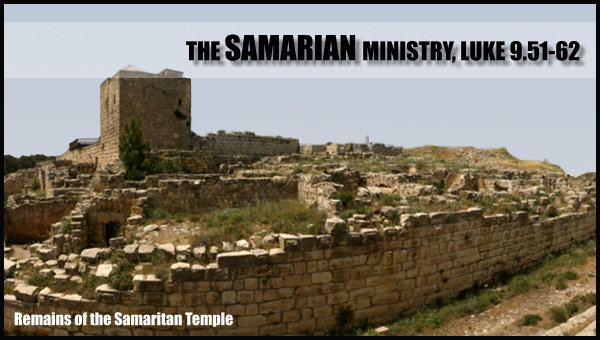By Tyson Thorne

The Samarian Ministry at Various Cities (9.51-18.34), 9.51-62
Luke transitions now from Jesus’ time among the people of the Galilee to his ministry among the Samaritans. This is a curious choice given the antagonism between Jews and Samaritans. After the death of King Solomon trouble spread across Israel, and the kingdom became divided. The Samaritans were a part of the Northern kingdom and comprised of the tribes of Manasseh and Ephraim. Under the wicked king Jeroboam, a new capital for worship was created on Mount Gerizim. He mixed Judaism with pagan ritual and as punishment for doing so God allowed the Northern kingdom to fall to the Assyrians. The population was deported, but much later allowed to return to their land where they continued in their traditions and intermarried with Gentiles.
This is the cause of disdain Jews have for Samaritans. The hatred ran so deep that Jews would go around Samaria, crossing the river Jordan twice on the journey, to get to the northern region of Israel rather than traveling straight north through Samaria. The Samaritans believed that they had preserved the true religion of Abraham and were devoutly monotheistic and worshiped YHWH. They did so not in Jerusalem, however, at the temple but instead built their own temple on the mountain Abraham sacrificed Isaac. This dispute is referenced in the Gospel of John when Jesus meets the woman at the well. Which is why this mission is curious. Jesus must have considered the Samaritans as part of Israel despite their mixing with Gentiles and pagan religions.
Unlike most Jews, Jesus did not go around Samaria; he intended to go through it and along the way continue preaching the kingdom. Jesus sent men ahead to the first city, an advance team of sorts. They were turned away making Jesus’ encounter a failure. This failure was due in large part to the racism that existed between the two groups. This was hardly unexpected and sets the expectation of the reader for the continued rejection Jesus would experience as he passed through the region. Jesus’ reaction was one of tolerance, but those of his disciples was markedly different.
James and John, still keeping their secret about what happened on Mount Tabor, still had Moses and Elijah’s visit on their minds. When they heard the people of the town would not receive Jesus they offered to call down fire from heaven to consume the town. This is an obvious reference to Elijah’s doing something similar when confronting the prophets of Baal (1 Kings 18.1-40). Clearly Jesus was not the only one who was effected on Mount Tabor. Unfortunately, James and John had learned the wrong lesson. Judgment for rejecting the Messiah would come, but it would be before the throne of Elohim not in a blaze of fury.
It wasn’t all bad news, however. Three Samaritan men volunteered to follow Jesus. The first approached Jesus on his own wanting to be a disciple. Jesus gave full disclosure as to what that entailed: giving up everything including a home and a bed. Jesus called the second man but that man’s commitment to his ailing father was greater than his commitment to Jesus. He wanted to wait a while to see his father through death and possibly receive an inheritance. Jesus’ reply was that the man should let the spiritually dead bury the physically dead, and that he should come to proclaim the kingdom of God. The third man only wanted to say goodbye to his family, but again Jesus persisted that this proclamation of the kingdom could not wait. The lesson was a simple one, a follower of Jesus could not have divided interests (like a farmer plowing a field must look forward and not back).
Still, the willingness of these men shows that some at least were open to Jesus’s message. The start of this ministry could have been worse.
|
|
